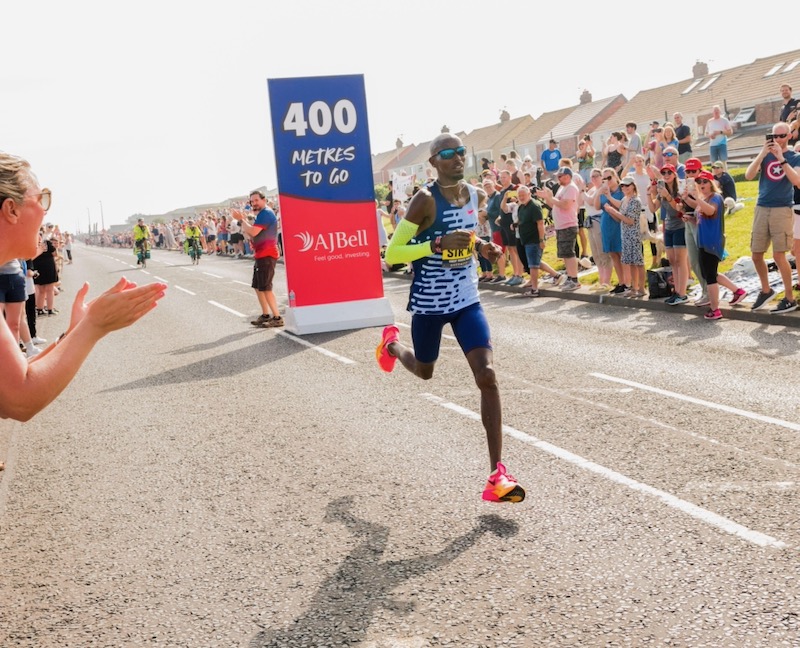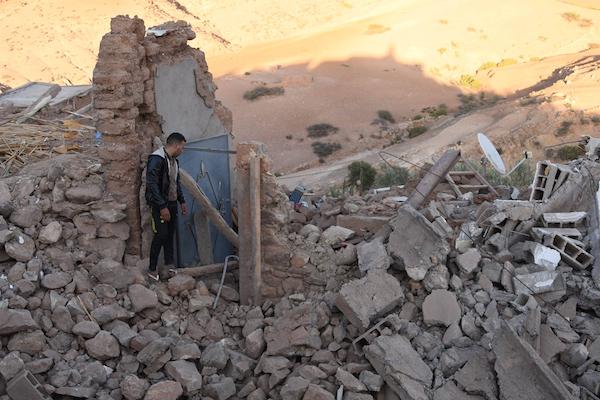Following a severe earthquake in the Atlas Mountains on 8 September, Morocco’s Diocese of Rabat voiced “its compassion for all the victims, in particular for the Moroccan families who are in mourning or who have injured among their members” in a statement from its archbishop, Cardinal Cristóbal López Romero.
“We also think of those who lost their homes and possessions,” he said. The archdiocese, which has churches in Marrakech and Ouarzazate, reported only minor damage, but the death toll in the remote villages affected had passed 2,500 by the weekend with thousands more injured.
Caritas Internationalis provided aid and support to affected areas. “We are in constant communication with Caritas Morocco and actively collaborating with Caritas Middle East and other Caritas members around the world,” the charity said.
Caritas Spain has launched an emergency campaign, while teams of Spanish firefighters have joined efforts to find survivors. Firefighters from across Spain have joined two charities, Bomberos Unidos Sin Fronteras (“United Firefighters Without Borders”) and Bomberos Para el Mundo (“Firefighters for the World”).
Antonio Nogales, who is supervising a team of firefighters, said they were heading south from Marrakech to the worst-affected area in the Al-Haouz province in the Atlas Mountains. “There isn’t a single house left standing,” he told the website Think Spain. “When we arrived no rescue team had even made it there yet. We were the first to reach the area, which is completely inaccessible.”
Pope Francis expressed his sorrow and “deep solidarity” with the people of Morocco and thanked rescue workers in the region at last Sunday’s Angelus.
A Church spokesman has welcomed the coup in Gabon which ousted President Ali Bongo at the end of August.
The coordinator of the Commission for Communications and Culture of the Episcopal Conference of Gabon, Fr Patrick Mabickassa, said that the situation was calm unlike in previous transitions of power.
“We thank God for this because in 2009 and 2016 following post-election violence, several families lost their loved ones,” he said. “There are families who to date have not had a funeral because the bodies of their loved ones were never found. But the fact that this year the army took control of the situation avoided violence and bloodshed.”
Fr Mabickassa was later photographed with the military leadership and said: “From 30 August 2023 to the present day, there has been a healthy collaboration between the population and the military. On the whole, the Gabonese people have reconciled with their army.”
He continued: “This act of the defence and security forces has been and continues to be welcomed by the people and this act of bravery and high responsibility on the part of the military has revived a feeling of hope and security in the public.”
Schools in Cameroon’s English-speaking regions remain closed after the beginning of term following threats from separatist militias. Bishop George Nkuo of Kumbo, one of the areas affected by fighting, has asked militants to “let our children go back to school”.
Archbishop Andrew Nkea Fuanya of Bamenda said last week that “children must go back to school – the best way to ensure the future of our country is via education.” The archbishop, who heads the Cameroon Bishops' Conference, called education a “fundamental right” and urged the government to ensure schools’ safely.
Separatists are fighting for an Anglophone state independent of largely French-speaking Cameroon. They have kept more than 700,000 children out of class for the past seven years through violent attacks.
Hours after a UK broadcaster aired a documentary on 5 September claiming Sri Lanka’s worst-ever terror attack on Easter Sunday 2019 was orchestrated from inside the government, Cardinal Malcolm Ranjith, the Archbishop of Colombo, renewed his call for an international investigation.
“Unless a transparent and sincere investigation is launched, we do not feel that truth and justice will be meted out to the innocent victims,” he said on 6 September.
In the Channel 4 documentary Sri Lanka’s Easter Bombings, Azad Maulana, a former spokesman of a breakaway Tamil Tiger rebel group that helped the government win the country’s bitter civil war in 2009, appeared to allege that top military intelligence figures met the bombers before the attacks on two Catholic churches and luxury hotels that killed 269 people and injured more than 500 others.
While world leaders gathered in India for the G20 summit last week, the G20 Interreligious Forum also assembled on 5-7 September at the World Peace Dome in Pune. Over 100 speakers and 2,000 delegates discussed the theme “Shaping world peace and sustainable development through interreligious harmony”.
Archbishop Felix Machado of Vasai, the general secretary of the Indian Bishops’ Conference, said he hoped peace would top the G20 agenda. “What good are good economic prospects if there is no peace in our hearts, if there is no peace in our families, if there is no peace in our society and in the world around us?” he said.
Archbishop Andrews Thazhath of Trichur said: “Despite our diversity, we are bound by one human family, which shares common challenges and responsibilities.”
More than 10,000 people attended an open-air Mass in Buenos Aires on 5 September to support Pope Francis after he was insulted by presidential candidate Javier Milei, who calls the Pope’s support for social justice an “aberration”.
The community Mass “to atone for the outrages against Pope Francis” in the run-up to Argentina’s general elections on 22 October” was organised by priests from slum neighbourhoods in the capital.
Jose Maria Di Paola, the priest known as “Padre Pepe”, said “it is unworthy of a candidate” to say such things “when social justice is part of the Gospel part of the Church’s social doctrine”.
The spokesperson of the Central American Jesuits, Fr José María Tojeira, has suggested that the imprisoned Nicaraguan Bishop Rolando Álvarez should be made a cardinal, since “his situation is very much like that of the martyrs”.
Fr Tojeira explained that the Jesuits have paid an indemnity to the staff of their two remaining colleges in Nicaragua, Colegio Centroamérica and Instituto Loyola, in case the authorities close them and freeze their bank accounts as they did with the Jesuit-run Central American University in Managua.
He said that Jesuit universities elsewhere in Central America are looking at the possibility at taking students from the closed university.
At the end of August, Fr John L Jenkins SJ, president of Notre Dame University, Illinois, wrote in The Washington Post: “Ortega’s attempt to extinguish Catholicism in Nicaragua merits world condemnation on a much larger, and louder, scale. As the president of a Catholic university, I am especially eager to rally university leaders in opposition to this persecution.
“But leaders from all walks of life should be condemning Ortega in the harshest terms. His regime should be isolated as an international pariah for trying to ‘disappear’ Catholicism, freedom of worship and free speech.”
A federal judge granted the Biden administration’s request ordering Texas to remove a controversial floating barrier made of buoys and razor wire in the Rio Grande river. The next day, however, an appeals court overruled the decision, allowing the barrier to remain while the federal government’s case against Texas proceeds.
The barrier was installed to deter migrants from crossing the river. Writing social media, the Archbishop of San Antonio Gustavo Garcia-Siller denounced the barrier as “a barbaric practice, a cruel practice”. He added: “There are other more human ways to engage with people.”
Bishop David Malloy, chair of the US bishops’ Committee on International Justice and Peace, called for a peaceful end to the nine-month blockade of the Lachin Corridor which connects Nagorno-Karabahk with the rest of Armenia.
“With the continued impasse of this conflict and the mounting consequences of this blockade, let us all be of one mind and one accord in our prayers for those suffering from this conflict – to see this impending humanitarian catastrophe averted and to see this conflict ultimately resolved through peaceful means,” Malloy said.
The blockade has prevented delivery of food and medical supplies to the local population.
The Catholic Nonviolence Initiative Days of Action, a project of Pax Christi International, begin on 21 September, the UN International Day of Peace.
They invite participants to learn about nonviolence from partner organisations in South Sudan, Peru and elsewhere and to pledge live non-violently. They run from to the 2 October, the UN Day of Nonviolence.
Pat Gaffney, of Pax Christi’s international executive committee, told The Tablet: “The Days of Action align with other projects-– the Week of Prayer for Peace in Palestine and Israel, and the Season of Creation – which also highlight the power of nonviolence.”
Bishop Joseph Hart, the former Bishop of Cheyenne, Wyoming, whose retirement was engulfed in controversy, died on 23 August.
In 2021, the Vatican cleared Hart of seven allegations of sex abuse against a minor. The allegations had previously been deemed credible by the review board of the Diocese of Cheyenne and Hart had been removed from ministry.
He denied the allegations, which date from his years as a priest in the Diocese of Kansas City-St Joseph, Missouri, which reached a settlement with ten victims. Allegations were also made by six men in Wyoming but prosecutors declined to press charges.
Philippe Jost, deputy head of the reconstruction team at the fire-damaged Notre Dame de Paris cathedral, has been appointed to lead the project following the accidental death of General Jean-Louis Georgelin last month.
Jost, a 63-year-old engineer and civil servant, knows the project in detail and immediately pledged to respect the target of reopening the cathedral on 8 December 2024. “I was the general’s partner for four years and it is in unity of thought with him that I will continue this mission,” he said.
Jost has spent most of his career in defence procurement and was teaching mathematics when Georgelin chose him as his deputy.
At least 3,200 Jews were hidden by 100 orders of nuns and 55 congregations of male religious in Nazi-occupied Rome, according to a list found in the archives of the city’s Pontifical Biblical Institute. News of the find emerged last week at a conference held at the Holocaust Museum of Rome.
Researchers say the names of the institutes and the numbers of Jews they harboured between September 1943 and the liberation of Rome in June 1944 were first published 62 years ago by the Italian historian Renzo de Felice. However, it was assumed that the source material de Felice had used to compile his list had been lost, until the recent discovery.
A tiny piece of anti-Fascist graffiti from a similar time has been discovered amid illustrations of leaves on a frieze in the offices of the Secretariat of State. The scrawl on a window jamb of the Apostolic Palace reads Morte Mussolini (“Death to Mussolini”). It was spotted during a routine maintenance check.
A 13-ft high statue of a Korean martyr is to be placed in St Peter’s Basilica. The statue of St Andrew Kim Taegon, weighing approximately six tonnes, is sculpted from Carrara marble. It will be unveiled on 16 September, the anniversary of his martyrdom in 1846.
The first native Korean to be ordained a Catholic priest, Kim was beheaded at the age of 25 for his endeavours to evangelise. In 1984, he was one of 103 Korean martyrs canonised by John Paul II. The next World Youth Day gathering is planned for 2027 in South Korea.



 Loading ...
Loading ...